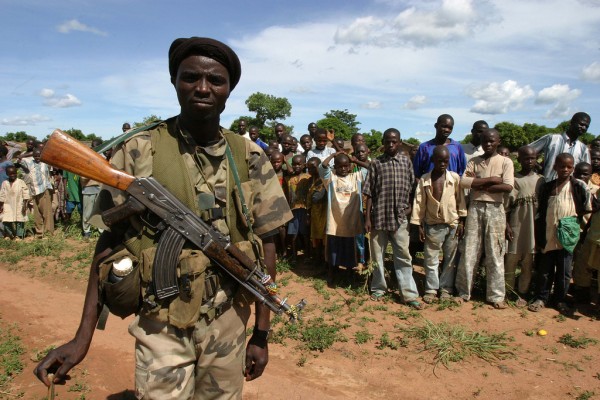States of emergency have been declared by President Kiir in Jonglei and Unity states, while the delegations from both sides of the South Sudan conflict have assembled in Ethiopia for peace talks now rescheduled for Thursday.
Peace Talks in Addis Abada will begin Thursday at the earliest. The talks had been originally scheduled to begin Wednesday. The talks will focus on “monitoring mechanisms for the ceasefire.”
The peace talks will be the first to host representatives from both President Kiir’s government and Riek Machar’s rebel opposition. The talks are being brokered by IGAD, the East African trade organization. Lazaro Sumebeiywo, a retired Kenyan general, will mediate the talks.
The delegation for Kiir is led by a former associate of the John Garang. Former ally of Machar, Lam Akol, is also among Kiir’s delegation. Machar’s delegation is led by a former governor of Unity State, accompanied by the widow of Garang.
John Garang was the founder of the SPLA and leader of the SPLA during the Second Sudanese Civil War. Garang served briefly as the first President of Sudan after the peace agreement in 2005, but died that same year in a helicopter crash.
Political prisoners being held by Kiir have still not been released. This release is a primary goal of Machar, who has stated that the release is a precondition for peace negotiations. The African Union has also urged Kiir to release the prisoners, as have ISAD mediators and the international community in general.
The President, for his part, has stated that he definitely will not share power with Machar. The President stated that Machar does not deserve power because Machar attempted to take power violently, although democratic means exist–notably the elections coming in 2015.
Bor, which was retaken by the rebel White Army Tuesday, was the scene of renewed clashes Wednesday.
The government of South Sudan partially withdrew from Bor, but reported that they were still fighting in the suburbs.
The South Sudanese government issued a statement that the SPLA had tactically withdrawn from Bor but that the SPLA was advancing back to attack the rebel army in Bor. The rebel army, which was removed from Bor last week before retaking the city Tuesday had issued a similar statement during the interim.
The humanitarian situation in Bor is worsening, as water, food, medicine, and sanitation needs press aid organizations to their limits.
Bor is a city of strategic importance. Bor lies 75 miles (120 kilometers) from Juba, capital of South Sudan.
Civil war is a major concern for the UN and U.S., who have both warned all warring factions in South Sudan that they must cease hostilities to prevent a civil war. The African Union has expressed the same concern.
The U.S. government has stated that it will hold responsible for their actions the leaders of any force that tries to seize power. The AU has threatened sanctions against any initiator of violence.
Uganda’s President Museveni has threatened Machar with Ugandan military intervention if the rebels persist. International mediators told Machar Tuesday that the Museveni threat would come into play if Machar’s forces moved beyond Bor toward the capital.
Several locations in South Sudan were the site of battles Tuesday and Wednesday.
In Mayom, rebels were dislodged and the SPLA is advancing, according to Information Minister Michael Makuei Leuth.
Bentiu, capital of Unity State, which is in the hands of the rebels, is also within range of a SPLA attack, according to army statements. On Tuesday, Colonel Philip Aguer told state TV Tuesday that the army was being moved toward Bentiu and Wednesday an army spokesman said that the SPLA can “advance any time” on the city.
Three tanks were captured by the SPLA after an offensive against the rebels in Nyeil Payam, Parieng county, Unity State, Wednesday. The rebels had attacked a village in Payam but had been resisted and forced to flee after three tanks belonging to the rebels were destroyed, reportedly. The locals of that area, mainly Dinka groups, had joined with the SPLA and battled the rebels. Both sides suffered heavy casualties and an American citizen was killed, according to UNMISS.
The conflict has affected all aspects of South Sudanese life.
Trade in South Sudan has been affected on a large scale. Foreign and local traders have suffered from looted markets, disrupted banking, and closure of roads.
Air travel in South Sudan was suspended by the government Tuesday. The suspension affected flights to all areas where there was rebel fighting, including Bor, Panyagor, and Akobo. The reason for the suspension was not provided by the government, but commenters suspected the reason was that Bor had fallen to the rebel forces. Air travel remained open to the rest of South Sudan; only flights to Unity State and to some parts of the Upper Nile state were cancelled.
(Correction based on comments below: only flights to Unity and Johnglei States have been cancelled.)
Kenya Airways announced the resuming of flights to Juba January 2. The airline had suspended flights December 24 due to the armed rebellion.
Sudan has announced that it is ready to begin receiving refugees from South Sudan.
Donations for SPLA soldiers have been requested from all South Sudanese who can give by a committee in Northern Bahr El-Ghazal state, one of the areas in South Sudan so far unaffected by the civil conflict. Last week SPLA spokespeople announced that 1000 SPLA soldiers had been wounded recently, mainly from Jonglei, Upper Nile, and Unity states and Juba.
South Sudan peace talks, rescheduled for Thursday, will convene in Addis Abada, Ethiopia, as states of emergency have been declared in Jonglei and Unity states, the two states in which rebels hold the capital cities.
By Day Blakely Donaldson
Sources:
Land and Sea Journal
Voice of America
Chimp Reports
Chimp Reports
Susan Page
Radio Tamazuj
Radio Tamazuj
Sudan Tribune
